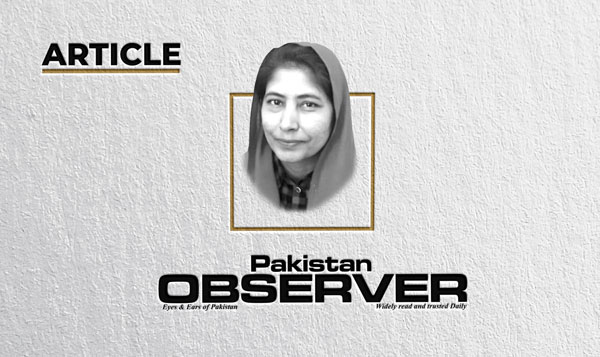Geopolitical constraints & foreign policy of Pakistan
WHY has Pakistan’s foreign policy faced constraints at regional and global levels? Has geopolitics been compelling Pakistan to prioritize its objectives in foreign policy?
I will investigate these questions. When we look at what happened in the last 75 years at regional and global levels, we see Pakistan, as the most key country that maintained its security and also strengthened its ties with major powers — the US and China etc.
Pakistan is a vital state in geopolitics in the region and the world. Pakistan’s foreign policy during the cold war, evidently, defined Pakistan’s strategic ties and determined the future course.
The foreign policy of Pakistan has been enduring multifaceted compulsions since its inception– regional and extra-regional dynamics have always forced Pakistan to reorient its foreign policy in accordance with the existing global geopolitical — in the 1950s it was the member of SEATO and CENTO- the only purpose of joining these internal military alliances was that Pakistan wanted to modernize its military vis-a-vis India.
Thus geopolitical factors affect Pakistan’s choices and priorities. Five factors have been fundamental in shaping the foreign policy of Pakistan. First, the troubled phase of the international system is ‘chaotic’ and remarkably puzzling.
As we know the international system is disorder, there is fundamental greatly powers shifts that have been in progress, multilateralism under extraordinary strain and rule-based international order has gradually been failed under the unilateral power, the US, that emerged after the disintegration of the (former) Soviet Union — and, of course, Pakistan played its critical role.
Since the World War-II, the world system has been defining the game of rule. So Pakistan’s foreign policy faces difficult challenges at regional and global strategic rapid transformation.
The rising multilateral system, strategic competition between the two major powers, US and China, and try to re-write the game of rules at regional level, denunciation of the internal law and leaders ‘behaviour remain the challenge for the persuading of Pakistan’s foreign policy.
Second feature is the mode of alignment and international alliances by many countries also playing a significant role.
The most likeminded countries are engaged to dominate the world system. Pakistan is also seeking to do this on different fronts.
The US’s strategic rift with China and the tilt towards India greatly influences Pakistan’s foreign policy and its choices.
Pakistan views the anti-China mood carefully and avoid to be the part of any conflict at regional and global levels.
Third, the international system is being characterized by the revival of strategic tension between the two big powers — the US and China. Their strategic standoff is dominating the landscapes of the world politics.
Conflectual relations between the US and China will have a really global impact with direct implications for Pakistan’s foreign policy.
The US-China strains have a direct endurable for Pakistan. Pakistan views the US tilt towards India as a changing geopolitical player.
The US is projecting India as a strategic competitor against China. India is prepared to side with the US. Pakistan considers that its longer term implications will depend on how deep this connection becomes in the future to shape the outlook regionally and globally.
Because the consequences of the US-India relations for Pakistan are already evident by the US ongoing extension of Indian military and strategic competences.
Pakistan has emerged as a pivot of China’s Belt & Road Initiative. Pakistan has seen of serious criticism by the US officials during Trump administration that was more vocal particularly about Pakistan.
Pakistan, therefore, sees its strategic alliance with China that as a strategic choice that Pakistan has made in a global geopolitical order.
Fourth, the withdrawal from Afghanistan defined the US-Pakistan relations- Pakistan, particularly, re-examined its relations with the US and try to establish its relations with Russia- but the new shift became a mirage.
Now Pakistan is looking to a broad based and multidimensional bilateral relations and wants to expand trade and investment with the US.
In April 2022 COAS said: “We seek to broaden and expand our ties with both the countries without impacting our relationship with the other”.
During the 20 years crisis, Pakistan’s policy was viewed through the lenses of Afghanistan. The US withdrawal from Afghanistan has determined the new geopolitical landscape of the region-Pakistan has become most vulnerable country.
Pakistan is struggling to manage its relations with the regional and global powers —previously, Pakistani government, made an effort to reorient it relations with Russia but without success, of course, geopolitics remained dominated and would not let Pakistan to reset its relations with Russia.
Fifth, relations with India is the most annoyed issue in foreign policy of Pakistan and these relations remain stuck in the new cycle of strain of hostility.
India’s abrogation of article 370 declared Indian occupied Jammu and Kashmir its constitutional territory.
India’s unilateral annexation of Jammu and Kashmir has forced Pakistan to revisit its foreign policy.
Pakistan’s foreign policy is shaped by the global geopolitics. If the US continues its strategy of containment of China “while projecting India as a counter weight to China this will , obviously, have adverse implications for the region and Pakistan”.
Pakistan is facing its most difficult challenges in foreign policy in managing relations with India in the aftermath belligerent actions in Jammu and Kashmir.
India’s hybrid warfare strategy against Pakistan increasing the new wave of terrorism. Pakistani Minister for Foreign Affairs, recently, has condemned India’s subversive policy to weaken Pakistan.
However, Pakistan has to review its foreign policy in the context of geopolitical environment to maintain its security and sovereignty.
—The writer is working at International Islamic University, Islamabad.








